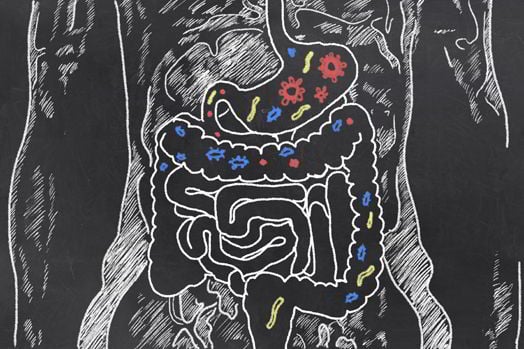8 Fun Facts About Your Digestive System

How much do you really know about your digestive system? We “break down” digestion with these fun and interesting facts you should know…
The Center Of Digestion Isn’t The Stomach— It’s The Small Intestine
When most people think of digestion, they think of the stomach. The truth is most of the process occurs in the small intestine. While the stomach helps break down food, the small intestine further breaks it down, then absorbs the nutrients and passes them into the bloodstream.
The Small Intestine Isn’t All That Small
Though only about an inch in diameter, the small intestine is 22 feet long. Meanwhile, the large intestine is only 5 feet long. The surface area of the small intestine reaches about 2,700 feet. That’s about the size of a tennis court!
Your Digestive System Doesn’t Need Gravity
Have you ever wondered how astronauts digest food in space? Your esophagus has strong muscles that constrict and relax in a wavelike motion to move food down to the stomach. Even if you ate something upside down (or in outer space), the food would be able to get to the stomach.
Stomach Rumbling Doesn’t Always Mean You’re Hungry
The rumbling is the sound of your stomach muscles contracting. Stomach rumbling commonly occurs during the digestion of food, fluid, and gases that pass through your digestive system. However, it’s most often associated with hunger. That’s because when your stomach is empty of food, there’s nothing to muffle the sound so it becomes louder and more noticeable.
You may be wondering why the stomach muscles contract when there’s no food present. After the contents of the stomach are passed to the small intestine, the stomach muscles contract to ensure all the food has been passed along.
Digestive Enzymes Are Used In Laundry Detergents
Some laundry detergents contain enzymes to help remove stains. Some of those same enzymes can be found in your digestive system, where they help break down food.
Stomachs Vary By Animal
As you know, humans have one stomach. However, cows, deer, and giraffes a four-chambered stomach to help with digestion. On the other hand, seahorses and platypuses have no stomach. Their food goes right from the esophagus and into their intestines.
Your Gut And Brain Are Closely Connected
Have you ever felt “butterflies” in your stomach when you were nervous? I bet you’re familiar with the saying “gut feeling.” Your brain and gut are very connected. They communicate with each other, which is part of the reason why your stomach can hurt when you’re stressed.
Bacteria Help Keep Your Gut Healthy
Not all bacteria are bad and make you sick. Your digestive system is home to trillions of bacteria, and most of them are good for you.
For your system to work right, you need the perfect balance of good and bad bacteria. Stress, your diet, and the environment can all disrupt the balance of bacteria in your gut. So unfortunately, for most of us, the bad bacteria outnumber the good— causing our tummy troubles and affecting our mood and sleep.
The good news: you can restore a healthy balance easily with probiotics. Probiotics replenish the good bacteria in your gut and alleviate those irritating symptoms, like bloating, and irregularity.
Peptiva is the only doctor-formulated nighttime probiotic we know of that restores your digestive balance, while you enjoy deeper, sounder sleep. All it takes is 1 tiny capsule before bed to ease your discomforts and help you sleep better.
To feel great, sleep great, and wake up refreshed, try a 15-day sample of Peptiva today.
